- Home
- Krolik & Wiernik
-
Ortenberg, Stupak,
Pekelis & Esterson - Goldstein & Moshkevitch
- The Towns
- Family picture album
- Family e-mail addresses
- Info for family members
- View our guest book
- E-mail us
Ancestral background
Reports, Trees &
Kinship
Our
familytreemaker site
The above link has up to
date descendant lists &
trees of all family
members
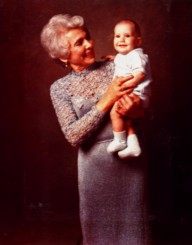
Toby & her grandson, Dani Goldstein, as an infant (ABT 1973).
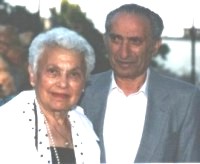
Toby & Haim Krolik at Benji's Bar Mitzva (summer 1995).
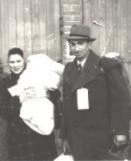
Toby & Haim holding Leah
(winter 1949)
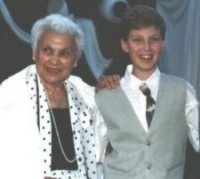
Toby & her grandson Benjamin Goldstein at his Bar Mitzva
(summer 1995).
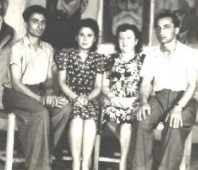
Toby & Haim (Linz 1947).
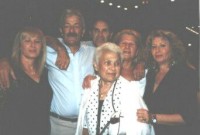
Toby & her nieces & nephews
(L to R) Ilana Ohayan, Joel Krolik, Haim Altmark, Toby, Rachelle Krolik,
Tzippi Altmark (summer 1995).
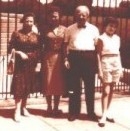
Tillie Wiernik Trager, Toby, Norman Trager, Keah Krolik Goldstein in
Washington.
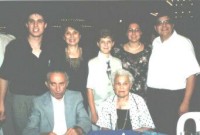
Toby & Haim with the Goldsteins at Benji's Bar Mitzva (summer 1995).
(Back row)Dani, Leah, Benji, Ellie, Michael.
(Front row) Haim & Toby).
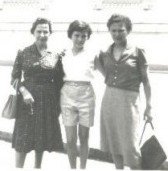
Tillie Trager, Leah & Toby in Washington.
From a grandson with loveOn Wednesday, February 25th, my grandmother, Toby Krolik, stopped breathing. The loss of a loved one never comes easy, and I miss my grandmother greatly. But I did not lose my grandmother last Wednesday.Life is not a mere chemical process. In this age of modern technology, the heart can go on beating almost indefinitely. Yet, to live requires the ability to think, to feel emotion, and to be able to appreciate, if not interact with, the world around you. What, lay in Bobie Toby’s hospital bed last Wednesday morning was not my grandmother as I knew her. It was but a mere shell of the woman I once knew and loved. Admittedly, that shell brought me some comfort, for it served to remind me of the physically strong, petite woman with the white hair and brown eyes whose love for me was boundless. A memento, which conjured memories of those special grandson/grandmother moments we shared throughout my childhood and adolescence. Memories which were her most cherished treasures. Memories of the way she used to shlep me up and down her street on my little wooden sled. Memories of the year she took me on the March to Jerusalem. I was maybe 5 years old at the time. We got started relatively late, and my legs only carried me so quickly. So, very early on we found ourselves on our own, well behind all the other marchers. The ascent up Mount Royal proved too much for me. Exhausted, I began to cry. I cried because I was 5 years old, and I wanted so desperately to complete the march. So, my grandmother, moved by my tears, and not wanting to disappoint me, picked me up, called me “her little sac of potatoes” and started to carry me up the steep slope of Mt. Royal, until she too grew too tired to continue, and was forced to accept a lift. Memories, like our outings to botanical gardens, Beaver Lake, Place-des-Arts, and the Shreiner’s circus. Memories of her Friday night dinners. She might not have been the most talented of cooks, yet she made a fricassee and tongue in tomato sauce beyond compare. Overcooking her fricassee and tongue somehow made them better. The whole family would look forward to those dishes, and nothing brought her more pleasure than watching us enjoy her cooking. She never ever sat down to eat with us. Preferring instead to serve, in order to make sure that everyone else had enough to eat. Memories of the French toast and fresh orange she served me whenever I slept over. French toast was another thing she cooked well, and it made up for the bath that would go along with it. Oh, how she loved bathing me. But oh, how I hated being bathed. Memories of the hours she would spend recounting her life’s story to me. A story of a poor orphan girl who never had a real family, and was forced to fend for herself from a young age. A story of a young woman of 24, who was forced to leave her native Poland to save her life. She spent the war years in a Siberian forced-labour camp, while most of the people and places she knew and loved were burnt to ash. As a child, her story intrigued me. Parts of it saddened me, especially the part when she lost the only known picture of her father when she was robbed on a train in Siberia. Part of her story frightened me. The part about her escape from the Nazis. I was only a child and I didn’t understand that the Nazis were not going to come and kill me in Canada in the 1970s. When I grew a little older, and began to understand, the fears subsided. When I grew older still, and understood a little better, the fears returned. Memories of her trip to Israel. She packed her two suitcases full of presents for my family. As a matter of fact, she packed them so full of presents that she didn’t leave any room for her clothes, and came to Israel with only the bare minimum. On that trip, we saw all of Jerusalem together, by bus of course. (Taxis were reserved for crises.) She absolutely insisted that we visit Yad Vashem, Israel’s Holocaust museum, together. It was just prior to my trip to her native Poland on the March of the Living. In the museum she found a map of Warsaw on display. She pointed out the street in which she used to live. “Zamenhof 24,” she said to me. “That’s where I used to live. I want you should go there when you’re in Warsaw.” I took a look at the map. It was a map of the Warsaw Ghetto denoting various landmarks. There was a landmark on her street, right across from her building, at Zamenhof 19. It was the Judenrat. I went to Poland. Her street wasn’t there. A new street, also named Zamenhof, had been built in its place. She didn’t know, or didn’t want to know, that they had burnt the street when they burnt the people. I didn’t want to, or couldn’t bring myself, to tell her. Instead, I took a picture of the street sign corner Mila Street. “Sorry,” I told her, “I didn’t have time to look for the house, but I found the street.” Then one day, Bobie Toby got sick. It was painful for all that loved her to see her memory slowly fading away. It started with minor absent-mindedness. She would forget where she placed things, or ask a question, forget having asked it, and repeat the same question two minutes later. Then she began forgetting names and major details from her day. I would visit her one-day, return the next, only to be asked why I hadn’t visited her in so long. At first my grandmother realised that her memory was slowly deteriorating and was very disturbed by this. But even when sick, my grandmother and I continued to have special moments. At one point she became so forgetful, that she forgot that she was forgetful. In this phase I noticed a certain joie de vivre that I had never before seen in her. She began to embrace life with a child’s enthusiasm. She was intrigued by the world around her, though unable to make head or tail of it. Life’s smallest pleasures began to excite her. All it took was a little attention, a warm smile, a flower, to make her day. I remember how on one occasion someone brought her a rose. She insisted on showing it to all the nurses who passed by. You could tell from the smile on her face and the cheeriness in her voice how delighted she was. No, this was not the Bobie Toby who used to schlep me up and down Kent Avenue on my sled… But she still loved me, I loved her, and she was happy, so I was too. The last few months were a difficult period. This is not how I want to remember Bobie Toby, nor how she would want to be remembered. I’d much rather remember the unconditional love and compassion Bobie Toby showed me, my parents, Michael and Leah, my Uncle Leon and Auntie Honey, my cousins Daniel, Jesse and Loren, and my sister and brother, Ellie and Benji. Circumstance did not allow my father and siblings to be here today, but they too feel the loss and are with us in spirit. I am thankful that my grandmother got to watch her children and grandchildren grow up. That she was able to celebrate and shep a little naches. I am thankful that her final days were peaceful. I am thankful for all the special memories my cousins, my siblings and I shared with her. And I am thankful for the fact that she gave us all reason to miss her. Bobie, though over the last number of years we lost an important part of you, I am thankful that part of you will live on in us forever. Before I finish, there are just a few people I would like to thank. Over the past number of years, many of you have proven yourselves loyal friends to me, my grandmother and my family, by helping us through our difficult time with innumerable acts of generosity and kindness. There are three people, whose extraordinary efforts I want to mention. Ben Sandler. As my grandparents’ situation deteriorated and they became less capable of coping on there own, you were always there for them, quietly helping out behind the scenes, and rarely receiving any thanks in return. When my grandfather needed to be taken to the bank, you would take him. When my grandparents needed a loaf of bread, or a bag of milk, you ran out and bought it for them. When their TV broke, you took it and had it repaired, without their asking. You were a loyal friend to them in times of health, but you proved just how loyal you were when they grew sick. The same goes for Manya Kantarovitch. I learnt of your from the whitefish I once found my grandmother eating, which she said, you had prepared for her. And from my grandmother’s frequent mention of your visits as the highlight of her week. And from the times I would call my grandmother and you would answer the phone. And from the groceries in my grandmother’s fridge that Bobie Toby said you had purchased. Manya…, thank you. One last ‘thank you’. One day I got a phone call informing me that my grandmother was in the hospital. I immediately rushed down there to keep her company. Once there, I felt I should call and inform someone of this. Leon was out of town at the time. But I didn’t need to think twice about whom to call. I picked up the phone, and called Shirley Gonshor. 20 minutes later Shirley was in the hospital, with two bags full of prepared food. She spent the day there with my grandmother and me. The food in the bags was for my grandfather. She was worried that he would have nothing to eat while home alone, so, when she was done at the hospital, she went and delivered him a care package. As unique a gesture as this may seem, these acts tend to be the norm with Shirley. In my two and half years in Canada, Shirley Gonshor was always there for my grandmother and me. Not a week went by without a phone call from Shirley, inquiring as to my grandmother’s situation, and asking if she needed anything. At times, she helped out with my knowledge. At other times, the only evidence of her presence were tins of food in my grandparents’ fridge, labelled with words like “kasha”, “rice” “roast beef” or “meatballs”, in her handwriting. Shirley couldn’t be here today. Nevertheless, knowing Shirley, she is still bothered by the fact that she isn’t here in Montreal, with us right now. But caring for the living is a much greater, and more difficult, mitzvah than caring for the dead. Shirley was here for us in our REAL time of need. Dan Goldstein |